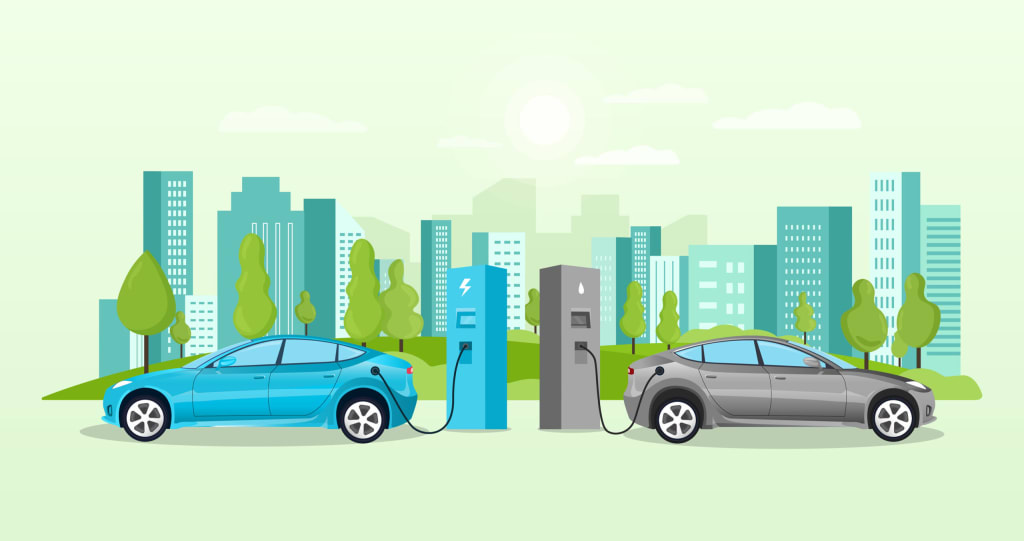The Battle between Electric and Petrol Cars: Pros and Cons.
Two types of cars.

Introduction
The world is rapidly changing and so is the technology that we use. One of the areas that have seen massive changes is the automobile industry. Electric cars are slowly taking over the market, and petrol cars are slowly becoming a thing of the past. But what is the difference between the two? Which one is better for the environment, and what are the pros and cons of each? These are some of the questions we seek to answer in this article.
Electric Cars vs. Petrol Cars
Electric cars are vehicles that are powered by electricity stored in batteries that drive an electric motor. On the other hand, petrol cars are powered by an engine that uses petrol or diesel fuel to drive the car. The difference between the two is that electric cars do not produce any emissions, while petrol cars emit harmful gases into the atmosphere. This is one of the main reasons why electric cars are becoming more popular.
Pros of Electric Cars
1. Environmentally Friendly
Electric cars do not release emissions into the atmosphere, making them environmentally friendly. This means that they do not contribute to air pollution, which is a significant problem in most cities worldwide. As a result, they help in the fight against climate change.
2. Lower Running Costs
Electric cars have lower running costs compared to petrol cars. This is because they have fewer moving parts, and maintenance is less frequent. Additionally, electricity is cheaper than petrol, and electric cars are more energy-efficient.
3. Quiet Drive
Electric cars are quieter than petrol cars. This is because electric motors produce less noise compared to petrol engines. This makes them ideal for use in cities, where noise pollution is a significant problem.
4. Fast Acceleration
Electric cars have instant torque, which means that they can accelerate faster than petrol cars. This is because electric motors generate maximum torque from zero RPM. As a result, they can reach their top speed much faster than petrol cars.
Cons of Electric Cars
1. Limited Range
Electric cars have a limited range compared to petrol cars. This is because their batteries have a limited capacity and need to be recharged frequently. The average range of an electric car is around 100-300 miles, while petrol cars can go for up to 500 miles on a full tank.
2. Long Recharge Times
Electric cars take longer to recharge than petrol cars take to refuel. The average recharge time for an electric car is around 30 minutes to several hours, depending on the charging point's power rating. This makes them less suitable for long-distance travel.
3. High Purchase Costs
Electric cars are more expensive to buy than petrol cars. This is because they use advanced technology and materials that are expensive to manufacture. Additionally, electric car batteries are costly, making the overall cost of an electric car higher than that of a petrol car.
Pros of Petrol Cars
1. Longer Range
Petrol cars have a longer range compared to electric cars. This is because petrol cars have larger fuel tanks that can hold more fuel compared to electric car batteries. As a result, petrol cars can travel for longer distances without needing to refuel.
2. Faster Refueling
Petrol cars take less time to refuel compared to electric cars. This is because petrol stations are readily available, and refueling takes only a few minutes. This makes petrol cars ideal for long-distance travel.
3. Lower Upfront Costs
Petrol cars are cheaper to buy compared to electric cars. This is because petrol cars have been around for a long time and are widely available. Additionally, petrol car technology is less advanced compared to electric car technology, making it less expensive to manufacture.
Cons of Petrol Cars
1. Harmful Emissions
Petrol cars emit harmful gases into the atmosphere, contributing to air pollution. This is one of the main reasons why electric cars are becoming more popular.
2. High Running Costs
Petrol cars have higher running costs compared to electric cars. This is because petrol is more expensive than electricity, and petrol cars are less energy-efficient. Additionally, petrol cars have more moving parts, which require more maintenance.
3. Noise Pollution
Petrol cars produce more noise compared to electric cars. This is because petrol engines are noisier than electric motors. This makes petrol cars unsuitable for use in cities, where noise pollution is a significant problem.
Conclusion
In conclusion, both electric and petrol cars have their pros and cons. Electric cars are environmentally friendly, have lower running costs, are quieter, and have faster acceleration. However, they have limited range, long recharge times, and are more expensive to buy. On the other hand, petrol cars have a longer range, faster refueling, and lower upfront costs. However, they emit harmful gases into the atmosphere, have higher running costs, and produce more noise. The choice between the two ultimately depends on individual preferences and priorities. However, with the increasing need to reduce air pollution, electric cars are becoming more popular and may eventually replace petrol cars.






Comments
There are no comments for this story
Be the first to respond and start the conversation.